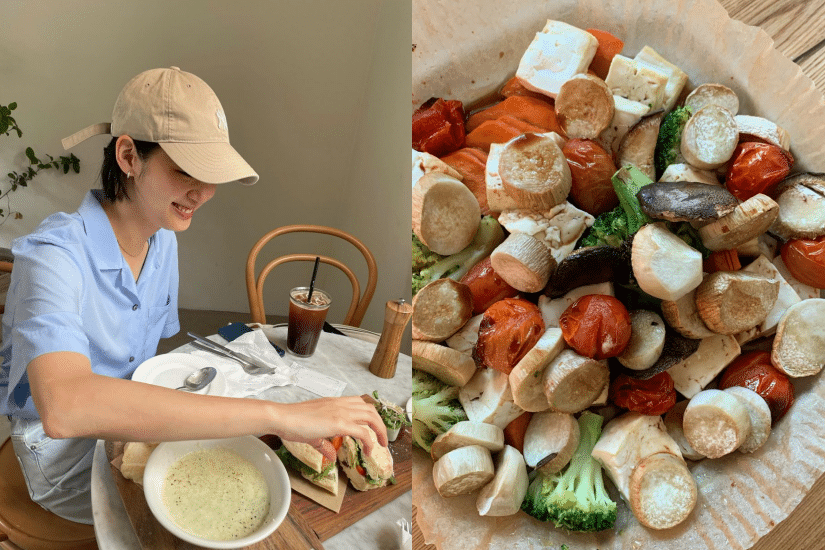In recent years, more and more Hong Kong people have been embracing a healthy diet, hoping to maintain their ideal body shape through food. Many friends who are currently trying to lose weight advocate for a vegetarian diet, which helps maintain a healthy body while achieving low-calorie weight loss! But can a vegetarian diet really help with weight loss? This time, we have invited accredited nutritionist, Xie Shi Min, to break down the pitfalls of vegetarian weight loss for us, and recommend two low-fat vegetarian meal plans to help you effectively lose fat in a healthy way!
//4 Categories of Vegetarian Diets//
There are many different types of vegetarianism, and the most common main types are:
1. Vegan: Only consumes plant-based foods and does not eat any animal products, eggs, or dairy products. 2. Lacto vegetarian: Does not eat any animal products or eggs, only consumes dairy products. 3. Ovo vegetarian: Does not eat any animal products or dairy products, except for eggs. 4. Lacto-ovo vegetarian: Does not eat any animal products, only consumes dairy and egg products.
//Are vegetable oils relatively healthier?//
Vegetable oils (such as peanut oil and olive oil) contain abundant monounsaturated fatty acids, which help lower bad cholesterol levels in the body and promote cardiovascular health. In contrast, animal fats (such as butter and lard) contain a large amount of saturated fatty acids, which increase cholesterol levels in the blood. However, coconut oil, which is classified as a vegetable oil, contains over 90% saturated fatty acids, higher than the 66% saturated fat content in butter. Therefore, vegetable oils are not necessarily healthy.
Moreover, unsaturated fats become unstable when used at high temperatures (such as frying or sautéing). If reused repeatedly, they can break down into harmful substances or become trans fats, which are detrimental to the body. Both vegetable oil and animal oil have their advantages and disadvantages, so everyone can choose the appropriate oil based on different cooking methods and smoke points.
//Is a vegetarian diet nutritionally sufficient?//
Vegetarians are prone to iron deficiency, and there are two forms of iron in food – heme iron and non-heme iron. Heme iron is mainly found in meat, poultry, and seafood, while non-heme iron is found in plant-based foods such as whole grains, nuts, legumes, and vegetables. Heme iron is more easily absorbed by the body than non-heme iron. Additionally, non-heme iron can be inhibited by plant acids found in whole grains, legumes, nuts, and other plant-based foods, making it harder to absorb. Furthermore, vitamin B12, which is important for the nervous system, is primarily found in animal-based foods and is only present in small amounts in plant-based foods, making vegetarians more prone to vitamin B12 deficiency.
Further reading:
- The Best CELINE Items to Get! Continuing the High-End Perfume Series, the Brand’s First Fragrance Soap Debuts
- Sweet and Stylish! Every girl’s shoe cabinet should have a pair, editor’s fashion recommended brand Mary Jane shoes
- Stay in Shape with These 4 Tips from “Moving” Star Goh Yoon-jung for a Well-Proportioned Figure
//Beware of the pitfalls of vegetarian weight loss//
Many vegetarian restaurants add a large amount of oil and sauce to their dishes in order to provide different flavors. They also cook the dishes by frying them, which may increase the intake of fat and lead to obesity. In addition, vegetarians may rely too heavily on carbohydrates such as rice and bread, and excessive intake of carbohydrates can be converted into fat in the body.
In addition, some plant-based meats have higher calorie and fat content compared to regular meats. Everyone should be careful in their selection. According to the nutrition facts table from the Food Safety Center, 100 grams of plant-based chicken contains 194 calories and 12.5 grams of fat, while 100 grams of fresh chicken contains 119 calories and 3.08 grams of fat. Carelessness could easily lead to a setback in weight loss.
//How to correctly eat vegetarian to lose weight?//
There are also different vegetarian products on the market. Kirby suggests avoiding purchasing vegetarian products that are pre-seasoned with a lot of sauce or deep-fried. When making a purchase, it is advisable to read the food labels to avoid unnecessary calories and salt intake. In addition, it is important to ensure that each meal contains enough protein. Vegetarians can supplement their protein intake with tofu, beans, and mushrooms to increase satiety. Furthermore, it is recommended to use low-fat cooking methods such as steaming, boiling, and stir-frying. According to the guidelines of the Health Protection Center, the recommended daily amount of oil for cooking should not exceed 25 to 30 grams (about 6 to 7 teaspoons).
//Recommended Vegetarian Low-Fat Menu//
| 餐單類別 | 早餐 | 午餐 | 下午茶 | 晚餐 |
| 奶蛋素 | 2 片 pancake 配 1 隻煎蛋 | 1 份菠菜班尼迪克蛋 – 菠菜 半碗(熟) – 雞蛋 1 隻 – English muffin 1 個 – 低脂芝士 1 片 – 低脂乳酪 2 湯匙 | 1 個蘋果 | 豆腐大啡菇素漢堡 – 玉子豆腐 4 – 5片 – 大啡菇 1 個 – 生菜 適量 – 蕃茄 2 片 – 漢堡包 1個 |
| 全素食 | 2 片麥方包配 1 杯無糖豆漿 | 羽衣甘藍醬配天貝意粉 – 羽衣甘藍 1 碗榨汁 – 天貝 4 – 5片 – 意粉(熟) 1 碗 | 1 個橙 | 鷹嘴豆墨西哥卷 – 鷹嘴豆 150 g – 墨西哥卷 1 片 – 生菜 適量 – 番茄 幾片 |
Learn more: Kirby Tse – Accredited Nutritionist (Hong Kong Nutritionist Association)
“Katspirit Nutrition Center” nutritionist, Bachelor of Food and Nutritional Sciences from the Chinese University of Hong Kong. Specializes in designing simple and delicious slimming nutrition menus according to the busy lifestyle of Hong Kong people.

